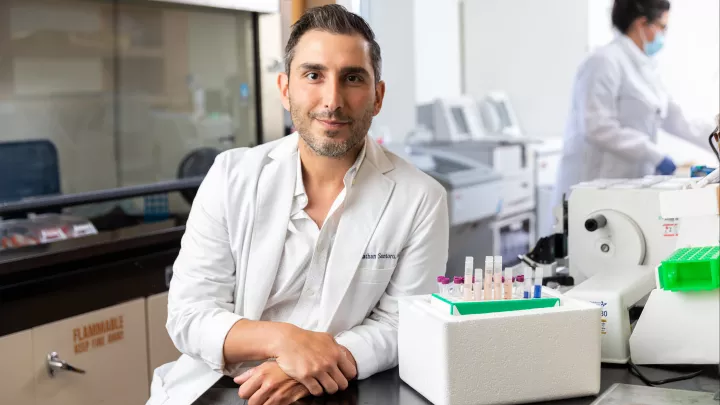Neuroimmunology Program
Neuroimmunologists treat children who have neurological conditions like multiple sclerosis due to problems with the immune system. Neuroimmunologists at Children’s Hospital Los Angeles are among the most experienced and extensively trained in the country. Our specialized program helps children have a better quality of life.
Our team uses leading-edge technology to catch the early signs of neuroimmunological and demyelinating disorders. This approach leads to timely care that often minimizes disability and promotes a healthy, active lifestyle.
Neuroimmunology Program: Why Choose Us
Children who come to the Neuroimmunology Program at Children’s Hospital benefit from our:
- Expertise: Specialists have advanced training in neuroimmunologic conditions and decades of experience. Many are leaders in their field. These capabilities enable us to diagnose rare and complex conditions, including autoimmune encephalitis and opsoclonus-myoclonus-ataxia syndrome, in earlier stages. Meet our team.
- National recognition: Our neuroimmunology specialists are Partners in Multiple Sclerosis (MS) Care through the National MS Society. Only a handful of pediatric centers in the country maintain this designation. This recognition also gives your family better access to support groups and educational resources.
- Emphasis on quality of life: Our holistic approach lessens the impact of neuroimmunologic and demyelinating disorders on your child’s life. We offer specialized services to support academic success and social well-being. We also provide education on reproductive health and fertility preservation options when appropriate.
- Commitment to long-term health: Neuroimmunologic conditions are often lifelong. As your child approaches adulthood, we ensure a successful transition to an adult neurologist. Our pediatric neuroimmunologist attends your child’s first appointment with their adult neurologist to discuss ongoing medical needs.
What Is Neuroimmunology?
Neuroimmunology looks at how the central nervous system and immune system interact with each other.
- The central nervous system includes the brain, spinal cord and nerves. It controls senses, movements and cognitive function.
- The immune system is the body’s defense against infections and toxins.
Sometimes, the immune system can be overactive or not function properly, disrupting how the central nervous system works. In other cases, autoimmune diseases such as MS or myasthenia gravis cause the body to attack itself. This autoimmune response damages healthy cells in the brain, spinal cord or nerves.
Symptoms of neuroimmunologic conditions and demyelinating disorders
Children with neuroimmunologic and demyelinating disorders may experience:
- Behavioral changes
- Cognitive problems, including difficulty thinking, learning and remembering
- Numbness or weakness
- Speech changes, such as slurring of words
- Seizures
- Tremors
- Unsteady gait or frequent falling
- Vision loss or abnormal eye movements
What to Expect at Your Child’s Neuroimmunology Program Appointment
We typically see new patients for initial neuroimmunology evaluations within two weeks. At the first appointment, your family meets with a pediatric neuroimmunologist. Our expert asks you questions about your child’s symptoms and performs a neurologic exam.
Your child’s first visit may also include:
- Imaging studies: MRIs or CT scans enable us to assess brain and spinal cord structures for abnormalities. These tests are often available on the same day as your child’s visit, keeping care moving forward.
- Neuropsychology assessment: These referrals are for children experiencing mood swings and uncharacteristic behaviors. Specially trained pediatric neuropsychologists evaluate whether physical changes in the brain are causing these issues.
- Immediate treatment: If your child needs medication right away, we refer them to our Infusion Center for same-day care. Therapies include medications we deliver through a vein (intravenously) to decrease inflammation and provide prompt symptom relief.
Neuroimunologic and Demyelinating Conditions We Treat
Our specialists diagnose and treat a broad range of conditions, including:
- Acute disseminated encephalomyelitis (ADEM)
- Autoimmune encephalitis, (AE) including anti-NDMAr encephalitis and limbic encephalitis
- Autoimmune epilepsy
- Chronic inflammatory demyelinating polyneuropathy (CIDP)
- Down syndrome regression disorder (DSRD)
- Guillain-Barré syndrome, Miller Fisher syndrome, Bickerstaff’s brainstem encephalitis and other GQ1b disorders
- Hashimoto’s encephalopathy and TPO antibody disorders
- Lupus cerebritis and other rheumatologic disorders affecting the brain
- Multiple sclerosis (MS)
- Myasthenia gravis
- Myelin Oligodendrocyte Glycoprotein Associated Disease (MOGAD)
- Neurologic disease associated with inflammatory bowel diseases (celiac disease, Crohn’s disease, ulcerative colitis)
- Neuromyelitis optica spectrum disorders (NMOSD)
- Neurosarcoidosis and IgG-4 related disease
- Opsoclonus-myoclonus syndrome (OMS)
- Optic neuritis (ON)
- Primary angiitis of the central nervous system (CNS vasculitis)
- Transverse myelitis (TM)
Neuroimmunology Resources for Children and Caregivers
Our specialists provide parents and children with additional resources, such as support groups that help make life a little easier. Often, participating in support groups can be a valuable way for children or caregivers to connect with others who are going through similar experiences.
Child and family resources include:


